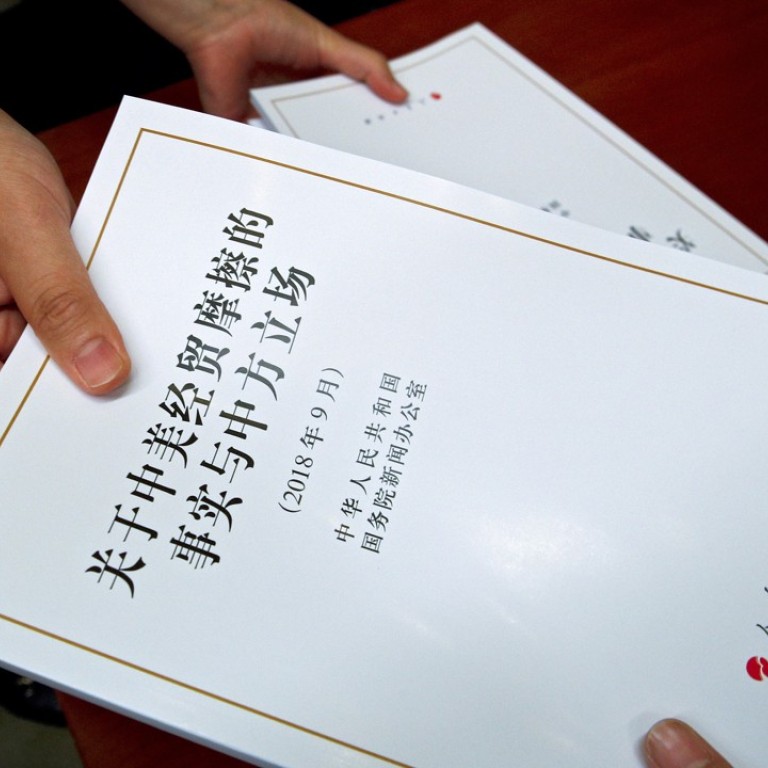
Why China used foreign sources to make its case as the defender of free trade in its war with the United States
Beijing’s white paper released on Monday relies on data and comments from overseas to argue its position – and for a good reason, analysts say
Beijing’s reliance on overseas sources for its 36,000-word white paper on the trade war is an attempt to convince an international audience that China is a victim in the dispute and the true defender of free trade, observers said.
Of the paper’s 88 footnotes, only a handful cite China’s National Bureau of Statistics or Ministry of Commerce, with the vast majority referring to overseas research, think tanks and analysts, from former US Treasury Secretary Larry Summers to specialists at the Peterson Institute for International Economics in Washington.
Analysts said that using respected US and other foreign sources to make its argument strengthened the intended appeal of the document, which was also released in eight languages.
Released on Monday, the white paper – “Facts about the China-US trade dispute and China’s stance” – is China’s most comprehensive explanation of its trade-war position to date.
The release was unusual in that it came during the Mid-Autumn Festival, a major Chinese public holiday. But it also came just an hour after US tariffs on an additional US$200 billion of Chinese imports took effect and followed Beijing’s decision on Saturday to refuse a US invitation for new talks to try to resolve the trade war.
Xi Jinping says trade war pushes China to rely on itself and ‘that’s not a bad thing’
Shi Yinhong, a government adviser and professor of international relations at Beijing’s Renmin University, said that the release was deliberately timed to “highlight the biggest confrontation in China-US trade relations in decades”.
“Relations have deteriorated severely this year. As the US has been adding to the list of goods subject to punitive tariffs, China felt it was high time to tell the world the facts [of the dispute] as they see them,” Shi said.
In the report, Beijing accused Washington of “bullying” tactics and economic “intimidation”, while underlining its own position that only cooperation on trade issues would produce results.
Two days later, Chinese President Xi Jinping underscored that position by making his first public comments on the trade war since it began in earnest in July.
Addressing workers at a factory in northern China, Xi said that rising “unilateralism and protectionism” was forcing China to rely more on itself for economic development and “it’s not a bad thing”, suggesting that he was willing and determined to pursue a protracted trade war with the United States if necessary.
Beijing has often used white papers to clarify policy positions on controversial international issues like human rights, using comments, data and research results from abroad to make its case more convincing to a broader audience.
China leaves door open for trade war talks but not with American ‘knife at its throat’
This time the document cited Summers to bolster its denial of Chinese theft of technology.
“You ask me where China’s technological progress is coming from. It’s coming from terrific entrepreneurs who are getting the benefit of huge government investments in basic science. It’s coming from an educational system that’s privileging excellence, concentrating on science and technology,” the white paper quoted Summers from an interview with CNBC in June.
“That’s where their leadership is coming from, not from taking a stake in some US company.”
Shi said that the foreign references were a deliberate tactic.
“There are divergences of views in the US. By using American voices and overseas research results, China’s views and opinions sound more objective and are more easily accepted,” he said.
The Oxford Economics “US Jobs and China Trade Report” released by the US-China Business Council in January 2017 was also cited for its conclusion that trade with China was an important contributor to American jobs and economic growth.
Louis Kuijs, the Hong Kong-based head of Asia research for Oxford Economics, said that the selective use of citations could give a false impression of reality.
“Citing results and findings of overseas analysts by itself increases the credibility, although the selective usage of favourable research findings allows authors to steer the overall conclusion of a piece in a desired direction, even if all individual findings are unbiased,” Kuijs said.
Huo Jianguo, former research head at China’s Ministry of Commerce, said the authors of the document avoided using domestic data and research results to try to influence an international audience.
China accuses US of ‘bullying’ on trade but calls for cooperation
But for all its rhetorical defence of free trade and globalisation, the white paper does not give any clear sign of how Beijing thinks the trade dispute will be resolved.
Huo said China would just “let it be” for now, leaving the “keys” to a solution in the hands of the US. “Beijing will wait and see for a while. If more punitive measures come from the US, it will retaliate. Over the longer term, it will actively seek to cooperate with other trade partners to replace the US, which will determine how supply chains change in the future,” he said.
Kuijs said Beijing would take a middle road, fighting with Washington but working with US companies.
“I don’t think that China is likely to pursue a break-up with the US. At the moment China’s position is that it has a serious conflict with the US government but will remain keen to engage with and welcome US companies to do business in and with China,” he said.
“To me that is in line with the broader position that China is trying to emphasise: that, despite the conflict with the US, it remains committed to further integrate into the global economy and open up its own economy.”

